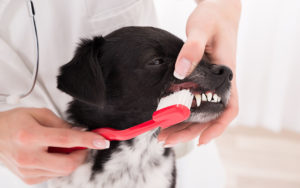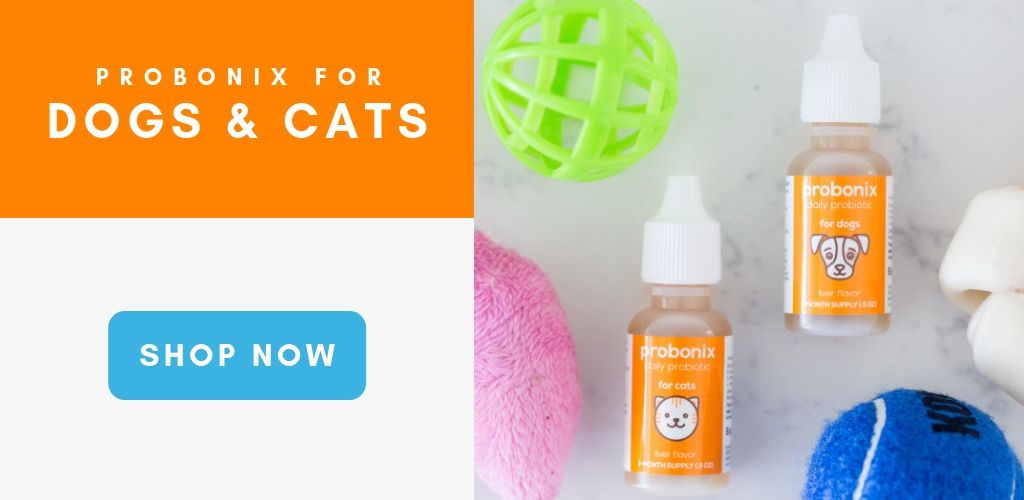 Have you ever noticed that many dogs have bad breath? Of course you have, but I’ll bet you didn’t know that bad breath could be a sign of a serious dental health risk. In fact, nearly 70% of cats and dogs have gingivitis by the age of 3! Even worse, this gingivitis can lead to periodontal disease which can cause severe pain and lead to bone loss, tissue destruction, and even internal organ damage as animals age. Dental hygiene is nearly as important for dogs and cats as it is for people, but many pet owners don’t know what they should be doing to help. February is National Pet Dental Health Month, so we caught up with our favorite resident veterinarian, Dr. Julie Towle, for some advice on how to improve dental health for our favorite fuzzy friends.
Have you ever noticed that many dogs have bad breath? Of course you have, but I’ll bet you didn’t know that bad breath could be a sign of a serious dental health risk. In fact, nearly 70% of cats and dogs have gingivitis by the age of 3! Even worse, this gingivitis can lead to periodontal disease which can cause severe pain and lead to bone loss, tissue destruction, and even internal organ damage as animals age. Dental hygiene is nearly as important for dogs and cats as it is for people, but many pet owners don’t know what they should be doing to help. February is National Pet Dental Health Month, so we caught up with our favorite resident veterinarian, Dr. Julie Towle, for some advice on how to improve dental health for our favorite fuzzy friends.
What causes dental health problems in my pet?
Heredity can have a huge impact on the dental health of an animal. Dr. Towle says, “We can have two cats or dogs in the same household. They’re fed the exact same thing, they’re the exact same age, and the owners give them the same preventative health, and one will need a dental cleaning every year because they have tartar and gingivitis, and the other will be pristine. That’s clearly heredity.”
Food quality is another a major issue affecting the dental health of dogs and cats today. The quality of commercial dog and cat foods has declined in recent years, particularly dry kibble. Feeding your pet dry kibble is basically the equivalent of feeding them fast food for every meal. Bulk bags of processed dry kibble may be cost effective, but they offer poor nutritional value for animals and can lead to compromised dental and overall health in the long run.
Lastly, improper dental care can lead to major dental problems, so let’s talk about what proper dental care looks like.
What can I do to keep my pet’s teeth clean?
Many dental practices have pets coming in with teeth literally falling out due to poor dental health. As Dr. Towle puts it, “If we had dental pain a tenth that bad, we would be running to the emergency room!” Good dental hygiene is just as important for our pets as it is for us, but many pet owners simply don’t realize that it’s an important aspect of pet ownership.
The quickest fix you can make for your pet’s oral health is to make sure they’re eating nutritious food. Get rid of the dry kibble and bring in wet, raw, or cooked foods with actual nutritional value. Step two is to start a dental hygiene regimen at home. It’s best to start this from a young age so they adapt early on, but older animals are still able to adapt regular cleanings. Start by opening their mouths and having a look around. Even if no cleaning is performed initially, this will get your animal used to having their mouth examined, and it allows you to familiarize yourself with what your animal’s mouth looks like so you can easily spot the bad stuff. From there, you can start to manually brush the teeth. Look into flavored toothpastes so that your pet starts to look at teeth brushing as its own reward. Dr. Towle recommends products with the VOHC (Veterinary Oral Health Council) seal of approval. These products have been tested to remove tartar from the teeth. Most dogs accept brushing with persistence, but cats can be more difficult. Ask your veterinarian for advice if your pet is having difficulty adjusting to brushing. And remember that brushing teeth is not a temporary fix. It needs to be a lifelong routine for your animal to be effective.
Last but not least, Dr. Towle recommends regular trips to the veterinarian for thorough teeth cleanings in both dogs and cats. The number of vet trips needed each year can vary depending on age, diet, and heredity. Ask your veterinarian for recommendations on how often your animal should have its teeth professionally cleaned. Good dental health can extend an animal’s life by years, so be sure you’re doing everything you can to keep your pet’s teeth clean.
People who liked this blog also read these:


